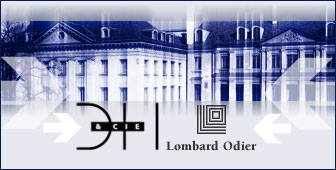
Merger creates private banking heavyweight

Two of Geneva's best-known private banks, Lombard Odier and Darier Hentsch, say their merger will result in a more aggressive strategy and stronger on-shore services.
The merger will come into effect on July 1, creating one of the largest private banks in the world. The new group, which will have combined assets of SFr140 billion ($89 billion), will be called Lombard Odier Darier Hentsch & Cie, or LODH.
The senior partners of the new institution, Thierry Lombard and Pierre Darier, told a press conference that the main aim of the merger was “to better serve our customers”. They revealed that they began talks on a possible merger in December 2000.
Consolidation
The announcement, which had been widely expected despite denials from both banks, comes during a period of consolidation in the private banking sector, which is facing increasing competition from bigger banks, increased information technology costs and pressure from weak financial markets.
In a report on Monday, the International Monetary Fund (IMF) said the consolidation process currently underway in the banking world was necessary and would lead to greater efficiency. But Michel Dérobert, secretary general of the Swiss Private Bankers Association, said he would be amazed if there were any other mergers involving Swiss banks.
Analysts say the two banks needed a merger because both are too big to be niche players and too small to compete with rivals such as UBS.
“Darier Hentsch, in particular, had a size which was between the big ones like Lombard Odier and Pictet and the small ones. It was only a question of time,” says Dirk Schütz, editor-in-chief of the weekly “CASH” economics newspaper.
He told swissinfo that the merger sent out a positive message: “It shows that the Swiss players are still strong enough to find solutions within the country. They don’t need help from the outside. It’s better for the financial centre of Switzerland, and especially of Geneva, that two Geneva players are merging.”
The merger comes on the heels of a similar deal between Basel-based Bank Sarasin, which earlier this year sold a 28 per cent stake to Rabobank of the Netherlands.
Complementary competences
Pierre Darier revealed that his bank had been approached by foreign bank, including, it is believed Deutsche Bank. But it was decided that the bank should retain its independent, Geneva identity, and it was felt that Lombard Odier shared the same history and values.
The two banks’ “complementary competences” would allow them to improve services and develop new ones. The core business of LODH, though, would remain private and institutional portfolio management.
Both Lombard Odier and Darier Hentsch belong to a shrinking number of banks which operate as private partnerships, meaning that the partners shoulder unlimited liability. Analysts say this closed structure limits banks’ ability to grow rapidly, cut costs or tap the markets for cash.
The banks said the merger would inevitably cause job losses, though no-one would be made redundant before the end of the year, allowing time to reflect on the new entity’s competences.
The merger is expected to cost nearly 200 jobs, with Hentsch likely to lay off some 30 people from its worldwide workforce of 560. Swiss media reports say Lombard could cut up to ten per cent of its 1,530 staff.
The two banks, both of which trace their origins back to the late 18th century, will reportedly have a combined staff of approximately 1,800.
Offshore centres
Private banks worldwide are coming under pressure to be more transparent about their activities, as the European Union and the United States seek to clampdown on “offshore” financial centres, of which Switzerland is the biggest.
The EU is insisting that such centres reveal the income of EU citizens’ assets so it can tax them appropriately – a demand Switzerland is fiercely resisting. The US is concerned that “offshore” centres provide an easy way for terrorists to move funds, although it says it is happy with Switzerland’s system of checks and balances.
Switzerland’s private banks between them control assets of around SFr400 billion, or one tenth of the total Swiss volume. Lombard Odier, Darier Hentsch and three other Genevan banks manage the lion’s share – SFr300 billion.
Officials of the new bank said moves to undermine Swiss banking secrecy, and an Italian fiscal amnesty, had influenced their strategy.
“We are pursuing more aggressively that before on-shore developments,” especially in Europe, says Jacques Rossier, a managing partner with Darier Hentsch.
by Roy Probert, with additional material from Robert Brookes

In compliance with the JTI standards
More: SWI swissinfo.ch certified by the Journalism Trust Initiative




























You can find an overview of ongoing debates with our journalists here . Please join us!
If you want to start a conversation about a topic raised in this article or want to report factual errors, email us at english@swissinfo.ch.